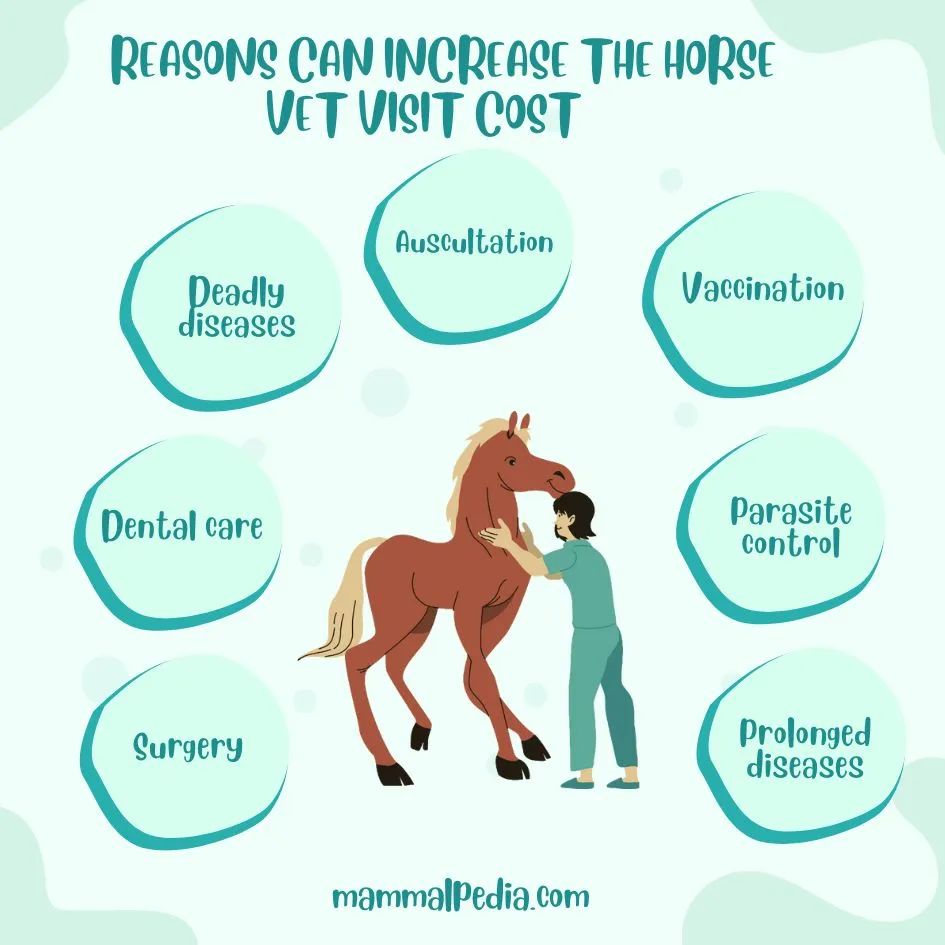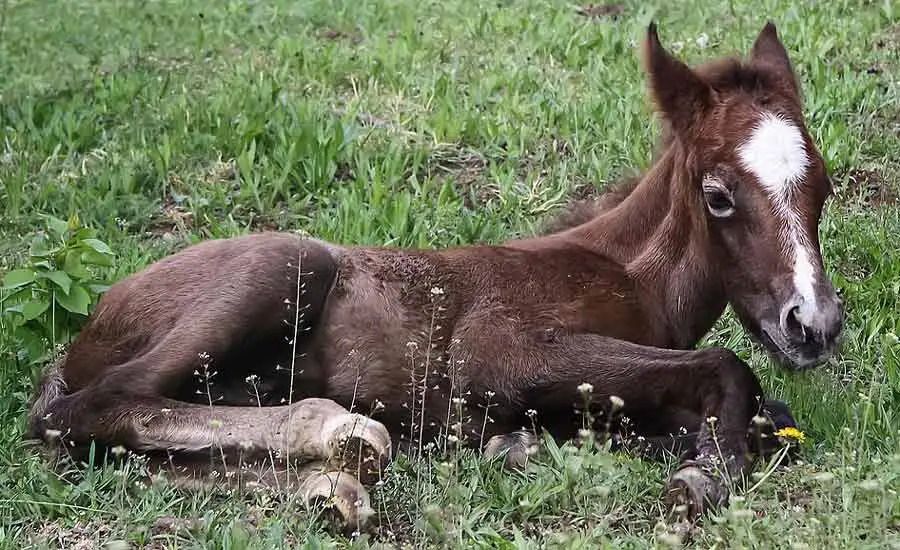Keeping a horse requires a decent budget every year. Vet cost is one of the largest parts of all other expenses. Horse owners need to ensure their horse’s good health is within budget.
So, knowing how much a horse vet visit costs helps maintain the budget.
The average monthly horse vet cost is $250 to $300. But this cost may increase or decrease based on factors like injury types, diagnosis, and critical testing costs.
A monthly cost may go up to $1000 if your horse is seriously injured or sick.
This guide will let you know the typical services of a vet for horses and the factors that can affect the cost of a horse vet visit.
So, let’s dive into the next step.

Related: Molasses can be a controversial topic when it comes to horses. Discover the answer to the question: Is molasses good or bad for horses?
What services does a typical horse vet visit include?
A typical vet consultation won’t give you all the services. You will get some basic diagnosis, physical examination, history receiving, and imaging there. These typical services will cost a minimum of $100 to a maximum of $300.
On the contrary, horse vets can charge multiple times for any serious surgery or prolonged treatment.
Collecting the horse history:
A professional veterinarian collects the horse’s life history in detail. Previous injury, medical track, and microchip information are some parts of the previous information. The previous history helps to recognize the disease.
Even it has a great impact to decide about a new disease, injury, or problem for a horse.
Basic checkup:
It is important to check up on a horse’s health. In this case, a vet observes the horse’s weight, blood pressure, or whether it has any external weaknesses. General fever, colds, and seasonal diseases are included in this checkup.
Related: Find out how much you can expect to pay for the removal of your horse’s wolf teeth. Learn about the different procedures available and the associated costs.
Grooming:
One of the most important reasons for visits reasons could be grooming. Regular grooming is required to keep your horse clean from dirt and debris. Besides, grooming is essential for knowing the overall health condition of a horse.
Grooming will reveal the condition of the horse’s skin. Grooming also includes cleaning the ears, nose, and eyes. All of these services are included in the regular vet visit.
What are some of the factors that can affect the cost?
We know the average cost. But some factors can affect the cost of a horse vet visit. Here are some crucial factors responsible for increasing or decreasing your horse’s vet cost.
You can use a horse cost calculator. The cost of owning a horse calculator is zero. So, it would be helpful for you.
Related: Confused about how much it costs? Learn the average cost of horse deworming, the factors that affect the cost, and tips on finding an affordable option.
Reasons that can increase the vet visit cost
Auscultation:
Auscultation refers to the testing of heart sounds and murmurs. Here a veterinarian tests heart sounds in three steps. These tests are arterial pulse, precordial pulsation, and jugular venous pulse examination. Besides, gastrointestinal and lung auscultation is included in this service.
Vaccination:
Vaccination is a standard vet treatment. It is needed to prevent potential diseases and viruses, and bacterial infections. A horse vet will vaccinate your horse within the regular charge. But you have to bear the cost of the vaccine.
Parasite control:
Parasite eggs are spread on the grass that is not visible to the naked eye. The horse takes several parasite eggs as horse grazes on the grass. Horses infected with parasites suffer from various intestinal problems such as gastrointestinal, colic, worms, and diarrhea. A typical visit is for your horse to get treatment for a parasite infection.
Flies and tick’s control:
As an outdoor animal, fleas and ticks can easily affect the horse. The vet can let you know about fleas and ticks. Even the vet will prescribe medication.
Dental care:
It is wondering that horse teeth are growing throughout life. And their teeth regularly wear down unevenly. As a result, they have created sharp points and edges.
Related: How apple cider vinegar can help horses with arthritis, from reducing inflammation to providing important minerals and nutrients. Learn why it’s a natural remedy for this common condition.
Deadly diseases:
Sometimes horses can get sick from some deadly diseases. A more frequent visit is essential for deadly diseases. It can add up to 2-3 times the cost.
As deadly diseases need high-quality imported medicine. So, the cost increase is a natural issue. If you know that your horse is affected by the below diseases, then assume the vet visit cost is increasing.
- HER (Equine Herpesvirus Rhinopneumonitis).
- PHF (Potomac Horse Fever).
- EI (Equine Influenza).
- SE (Streptococcus Equi).
- Tetanus (Lockjaw).
Surgery:
Horses rarely need surgery. But sometimes, they get sick from colic and Equine Herpes Virus. This type of surgery requires additional preparation, time, and expensive medication. Besides, a horse must stay at a vet care point for observation after surgery. All of these must increase the horse’s vet cost.
Prolonged diseases:
In the case of primary disease, horses need to take regular medication, vet visits, and observation. And this treatment should go under an expert veterinarian. As a result, costs increase.

Reasons that can decrease the vet visit cost
Good immune system:
When a horse has a good immune system, a horse can’t easily get sick or be affected by parasites and worms. A better immune system can protect a horse from several deadly viruses and bacterial infections. As a result, you can save on deworming and expensive vaccination costs. But don’t forget to provide mandatory vaccination.
Having an indoor lawn or yard:
If you can arrange an indoor yard or larger lawn for the horse, then parasites can’t infect the horse. Besides, the clean and secure indoor environment reduces the regular grooming cost.
Grooming at home:
A large amount of money requires expenses behind grooming in the year. You can save some bucks if you can groom your horse at home with basic instruments and ingredients.
Related: Are you thinking about buying a white horse? Learn about the cost, dietary needs, appropriate living quarters, and more. Get the information you need to make an informed decision.
How can we save money?
How if you can save money without compromising your vet’s care and treatments? Good, right? So, let’s know some effective ways to reduce horse vet visit costs.
Turn your horse inside the home lawn:
The horse is naturally outdoors, but you can try to keep it inside the home. In this case, nice bedding and shelter protect it from several diseases and injuries. On the contrary, the horse can get hurt and infect an outdoor garden or field.
Ask the vet for a discount:
If you are a regular client, then ask for a discount on vet services like vaccinations, grooming, medication, diagnosis, and tests.
Wait for occasional offer:
Generally, vet consultation centers and personal vets offer discounts on occasions like Christmas. So, you can wait for those days for vaccinations or grooming. But this is not suitable when your horse needs emergency grooming or treatment.
Frequently Asked Questions (FAQs)
What is the average cost of owning a horse?
How much does it cost to own a horse for a year? According to the “University of Maine” report, a horse’s average high-quality yearly expense is about $3,876.
And the medium-quality owning cost is $2,419. But the average monthly horse vet bill starts from a minimum of $200 to a maximum of $350.
How often should a vet see my horse?
It depends on the health condition and age of your horse. Generally, a kid’s horse needs a vet visit very often.
But an adult horse needed at least one visit in a year. If possible, you can go more frequently. On the other hand, an older horse is required to see a vet twice or three times at least a year. Remember that sickness can often occur in an older horse.
What does a horse vet check include?
Eyes, mouth, and teeth checking are the most common in horse vetting. However, a vet visit check also includes heart and lung auscultation. In addition, professional vets can give some tests to determine a horse’s internal and external physical condition.
How much per month does a horse cost?
The average monthly horse-owning cost is $100 to $300 if an owner pets a horse in the house. In this case, the owner has to arrange for feed, vet treatment, dentist, grooming, and farrier cost per year. This average cost will be doubled or tripled when you keep it in a rented place.
See also: Do you need to find cheap horse fencing? Get ideas for the best type of fencing for your horse, without breaking the bank.
Conclusion
We have already covered how much a horse vet visit costs.
The average cost of a horse vet visit cost is $250 to $300. But there are some factors that affect how much a horse visit costs.
In some serious issues like deadly diseases, surgery might be expensive. But you can also reduce the horse vet visit cost by following some factors.



